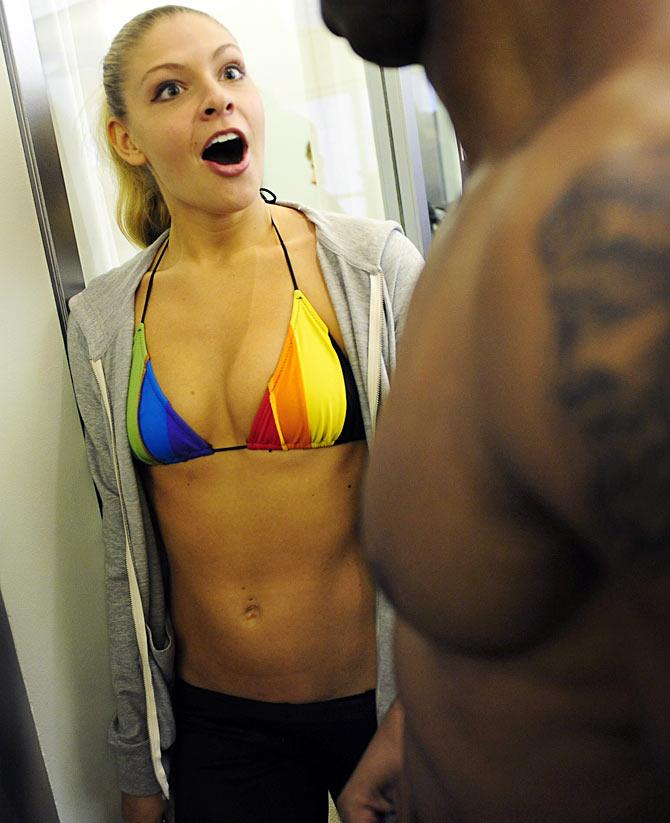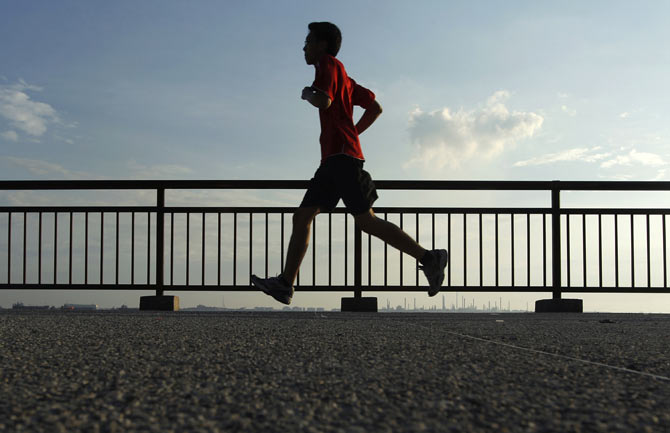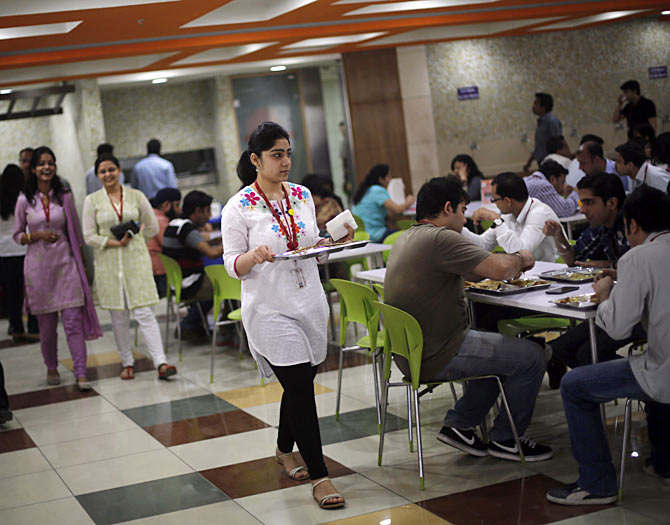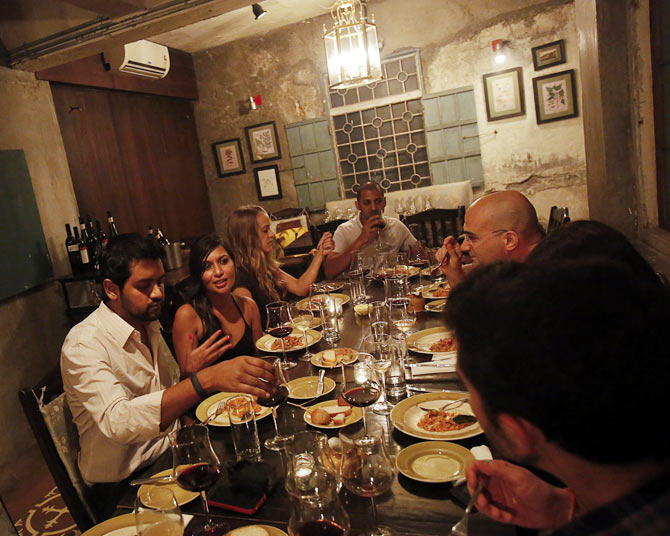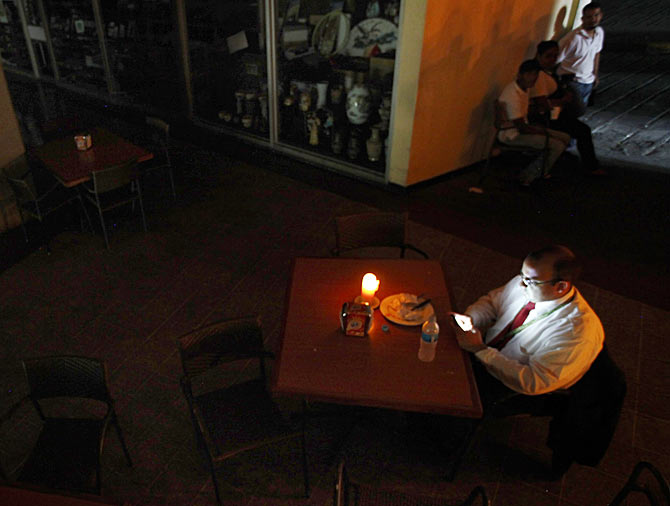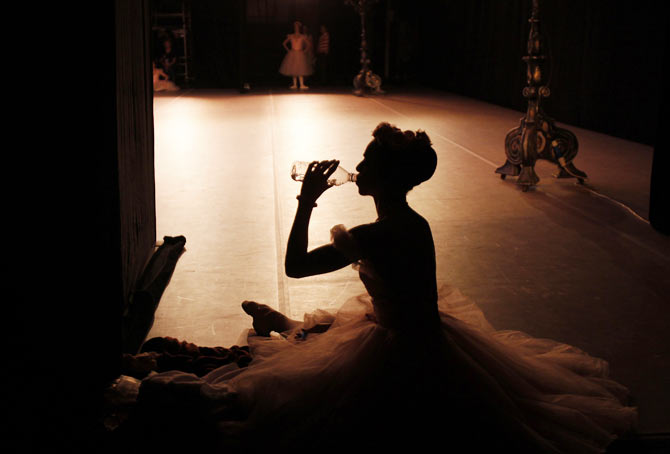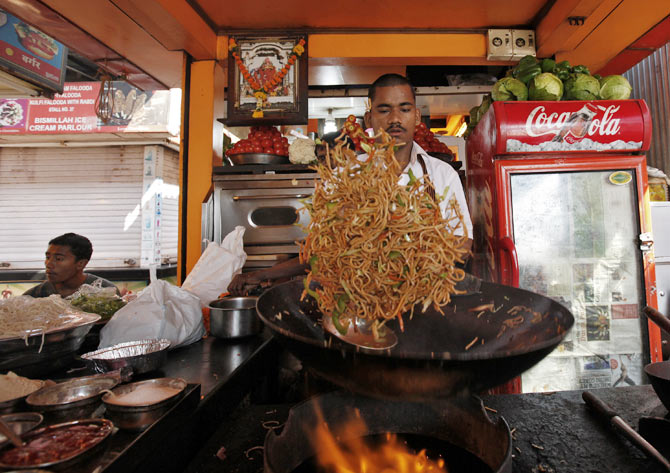 | « Back to article | Print this article |
Here's how to blast that ugly flab!
Here's how to blast that ugly flab!Losing weight isn't always easy. But here's what you can do for a start -- stop. making. excuses.
Dietician and fitness expert Namita Jain's latest book 9 to 5 Fit talks explains how your office makes you put on weight and just what you can do to keep it away.
You can start, as Jain says, by asking yourself if you really want to lose the weight or are you just happy complaining. Read on!
It's easy to want to lose weight but probably as difficult to actually do. And if you're a working professional, it's probably ten times tougher. Erratic working hours, stress and a sedentary lifestyle are more a norm for today's young workforce than an exception... and a recipe for obesity and related diseases.
Fitness consultant Namita Jain's latest book 9 to 5 Fit addresses the office-going population and offers handy tips on little things you can do to make lifestyle changes so you can lead a healthy life. (Purchase a copy of the book here)
Read: Is your office making you FAT? Here's how to lose those kilos
Also read: Working long hours? 6 ailments you'll most likely suffer from
The book also quite brutally lists out all the things office-goers do wrong and holds up a mirror to those of us who simply keep talking about wanting to lose weight but never really do anything about it.
Here, Namita Jain lists out exactly what you must do to lose weight. No excuses accepted. Read on:
Set your goals
Ask yourself what is it exactly you want to achieve," Namita Jain says. "You may want to lose weight or build muscle or simply increase your stamina."
Once you've decided on that, set your goal and ask yourself if you are willing to give what it takes to reach it.
Don't be too ambitious -- losing ten kilos in two months won't be possible.
Be realistic and ensure you work towards getting those results; this will motivate you to work further.
Set your target of a kilo a month two kilos at best.
Can't escape cardio
Once you set your target, commit yourself to give what it takes to achieve it.
If you haven't worked out for a long period of time (even a month or two can be long in some cases), start out by walking," she says.
Walking is the easiest of the cardiovascular exercises. It helps your body break out from the old routine and ease into a new, more active one.
Celebrity fitness trainer Abhishek Sharma speaks extensively on the topic. He suggests a four-week routine in his book Fitness on the Go and explains it in detail here.
The important thing to remember is you must not go head on into any serious workout else you are bound to suffer injuries.
"Cardiovascular exercises help you burn most calories," Jain says. "You can graduate from walking to swimming and cycling. Whatever you do, remember there is no escaping cardio."
Eat slowly, eat well
Long before she became a dietician Namita Jain had her struggle with weight. An important lesson that came out of that battle was that you cannot compensate eating too much by working out harder all the time.
"I liked working out so I'd think I'd burn out the extra calories by running an extra mile or swimming for longer. I realised it doesn't work that way much later. You have to watch your diet. What you eat matters but how you eat it matters as much," she says adding something we've been told since we were kids but never followed, "Eat slowly; chew well."
Eating in a rush is the root cause of most health issues today, Jain says.
"Because we eat in a rush, we tend to eat more. And by the time we are done we have overeaten and we get into the vicious circle."
Eat light at night
Going easy on one's dinner is an idea that's been explored by several dieticians. Rujuta Diwekar speaks of it in most of her books as does the compulsive crash dieter Kalli Purie.
Namita Jain herself has written about it at length in her previous book The Four-Week Countdown Diet (read this) and continues to stress on it.
She says that dinners in India tend to be quite late and heavy. It's when you return home after a long, hard day's work and you want to reward yourself. The meal becomes that reward.
Worse, most of us end up going to bed soon after our meals leaving little or no time for it to digest.
Jain says that ideally there must be a two-hour gap between your meal and bedtime. The lighter the meal, the better prepared you are to start healthy the next morning.
Stay away from distractions
Most of us treat mealtimes as an excuse to catch up on our reading or television shows.
Jain argues that any form of distraction doesn't work well for digestion.
"One of the major ingredients in our food is our phone!" she says incredulously. "You have to put it away. Turn off your television and be aware of what you're eating. The more aware you are of what you eat, the better you will savour it and eat less."
Stay hydrated and sleep well
What oil is to cars, water is to the human body, Jain says. She recommends drinking at least two to three litres of water every day.
"If you have less water the body functions less efficiently so consume water even if you aren't thirsty."
However if you have the tendency to visit the bathroom more regularly than normal, Jain says it might be prudent to avoid drinking closer to bedtime.
"It does little besides disturbing your sleep and getting a good night's sleep is as crucial to your metabolism as working out and eating well," she says. "Sleeping well helps you feel more energetic, positive, lighter and better."
Fight your food cravings
Jain says the best way to fight a food craving is to have a balanced diet. "Craving sets in when your body is deprived of one of the essential nutrients," she says.
For instance, if you've cut down on carbohydrates your body will crave for sugar because cereals get converted to sugar. The craving for sugar is because your body needs a quick surge of energy."
Of course it could be an association or a specific liking.
"We have our preferences for certain foods -- Chinese or street food for instance or sweets perhaps. But if you're watching your weight you have to be smart with your cravings too.
If you like vadaa pav, have just one rather than making a meal out of it and having two or three so you can have a healthy meal later on. Before you have it, drink a few glasses of water so you're feeling full and you don't overeat."
To conclude, Jain advises you to 'rate your cravings'.
"If you have to choose, let's say, between a samosa and a laddoo, pick the one you'd enjoy more than the other. That way you don't kick yourself for eating it later," she says.
